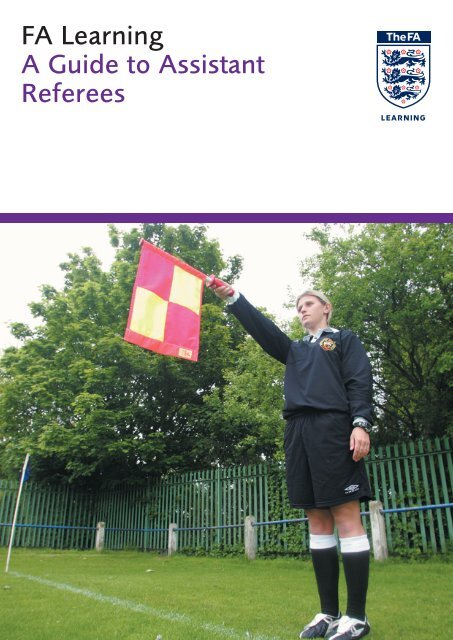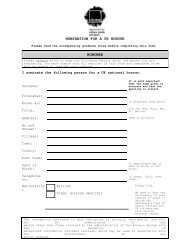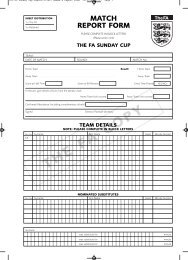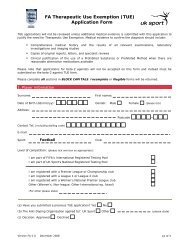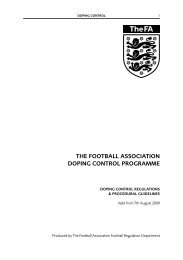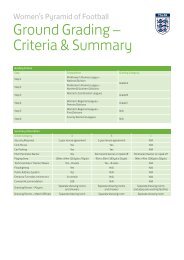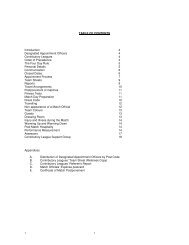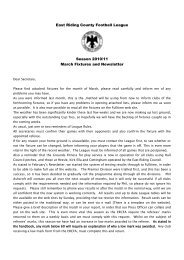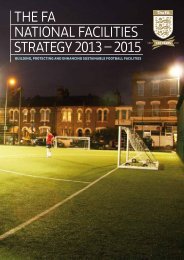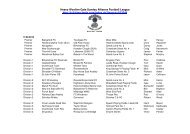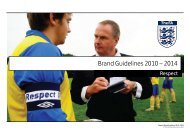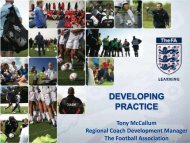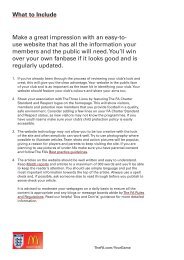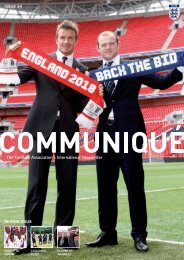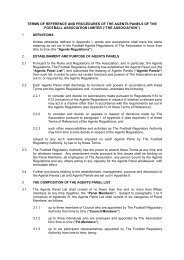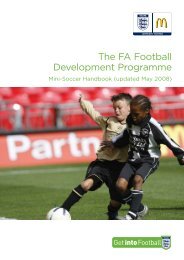A Guide to Assistant Referees - The Football Association
A Guide to Assistant Referees - The Football Association
A Guide to Assistant Referees - The Football Association
Create successful ePaper yourself
Turn your PDF publications into a flip-book with our unique Google optimized e-Paper software.
FA Learning<br />
A <strong>Guide</strong> <strong>to</strong> <strong>Assistant</strong><br />
<strong>Referees</strong>
Contents<br />
Foreword and acknowledgement 2<br />
Introduction 3<br />
<strong>The</strong> promotion pyramid 4<br />
Glossary of terms 5<br />
Responsibilities of an assistant referee 6<br />
Techniques of an assistant referee 11<br />
Pre-match briefing 13<br />
Self-evaluation 14<br />
Publications 18<br />
Conclusion 19<br />
Further information 20<br />
GAR-1
Foreword and<br />
acknowledgement<br />
Much advice has been offered <strong>to</strong> referees at various stages of development, from newly qualified officials<br />
through <strong>to</strong> the pinnacle, the international list recognised by FIFA.<br />
In 1991 FIFA established an international list of specialists capable of assisting the referee in <strong>to</strong>p-level<br />
matches. Later linesmen were renamed as assistant referees because of the increased duties assigned <strong>to</strong><br />
the role. <strong>The</strong> <strong>Football</strong> <strong>Association</strong> recognises the importance of the increased role and considers it<br />
appropriate <strong>to</strong> offer some useful advice specifically targeted at assistant referees.<br />
This guide should be of considerable benefit as it sets out, in simple terms, the important aspects of the<br />
role in supporting the referee in his increasingly difficult job.<br />
<strong>The</strong> contributions of many colleagues involved in referee instruction are much appreciated and<br />
acknowledged on behalf of <strong>The</strong> <strong>Football</strong> <strong>Association</strong>.<br />
<strong>The</strong> information in this booklet is provided as further advice for you <strong>to</strong> consider as you embark upon your<br />
career as a match official. Like refereeing, being an assistant referee can provide much enjoyment,<br />
satisfaction and healthy exercise. It also allows you <strong>to</strong> meet and make new friends among players, club<br />
officials and referees. You will be in good company. Thoroughly enjoy giving this extremely useful service<br />
<strong>to</strong> the game, for the benefit of the participants. Though it may not always appear <strong>to</strong> be the case, your<br />
contribution <strong>to</strong> the game will be appreciated.<br />
Ian Blanchard<br />
Head of National Referee Development<br />
June 2008<br />
GAR-2
Introduction<br />
This booklet is for the guidance of referees in the early stages of their careers, who have gained the basic<br />
knowledge and skills <strong>to</strong> referee. <strong>The</strong>y may be called upon <strong>to</strong> act as an assistant referee in County Cup<br />
Competitions, or local cup finals. <strong>The</strong>y may, in the future, be elevated <strong>to</strong> the role of assistant referee on a<br />
more senior league.<br />
It must be emphasised that much of the information contained within this booklet is applicable <strong>to</strong> assistant<br />
referees at all levels.<br />
<strong>Referees</strong> are reminded that the Laws of <strong>Association</strong> <strong>Football</strong> give assistant referees specific responsibilities.<br />
Although any decision rests with the referee, the obligations of assistant referees are manda<strong>to</strong>ry. <strong>Referees</strong><br />
must control the match in co-operation with the assistant referees and, where applicable, with the fourth<br />
official. <strong>The</strong>y should also act on the advice of assistant referees regarding incidents which they have<br />
not seen.<br />
<strong>Assistant</strong> referees are reminded that their duties are specified in Law 6, and their responsibility includes<br />
absolute support for the referee, <strong>to</strong> assist with successfully controlling a game. In every match there will be<br />
many occasions when the assistant referees will be required <strong>to</strong> judge their level of involvement from the<br />
<strong>to</strong>lerance level set by the referee.<br />
Concentration throughout the game is essential. <strong>Assistant</strong> referees must also be aware of the control being<br />
exercised by the referee and ensure that they offer support on match control either during or after the<br />
match. Opportunities should not be missed <strong>to</strong> evaluate performances on every occasion.<br />
In refereeing circles one often hears the comment that acting as an assistant referee is much more difficult<br />
than refereeing. By noting the content of this booklet, not only will you gain enjoyment and satisfaction<br />
when fulfilling this important supportive role as an assistant referee, but you will also develop the<br />
necessary skills <strong>to</strong> perform successfully at whatever level you achieve.<br />
GAR-3
<strong>The</strong> promotion pyramid<br />
FIFA REFEREE<br />
NATIONAL LIST OF REFEREES<br />
PANEL LEAGUE REFEREES<br />
FIFA ASSISTANT REFEREES<br />
NATIONAL LIST OF ASSISTANT REFEREES<br />
PANEL LEAGUE ASSISTANT REFEREES<br />
CONTRIBUTORY LEAGUE REFEREES<br />
CONTRIBUTORY LEAGUE ASSISTANT REFEREES<br />
SUPPLY LEAGUE REFEREES<br />
SUPPLY LEAGUE ASSISTANT REFEREES<br />
<strong>The</strong> Promotion Pyramid shows<br />
that there is a clearly defined<br />
pathway along which referees<br />
may move from the local leagues<br />
<strong>to</strong>wards the FIFA lists. It is the<br />
usual practice for referees <strong>to</strong><br />
operate at one level below which<br />
they function as an assistant<br />
referee, although this does not<br />
always apply <strong>to</strong>wards the upper<br />
levels of the pyramid. However,<br />
new referees are recommended<br />
<strong>to</strong> strive <strong>to</strong> move up the pyramid<br />
by working hard at their own<br />
present level before looking<br />
<strong>to</strong>wards the next level that can be<br />
achieved. By working hard at<br />
developing their refereeing skills,<br />
they will improve both their on<br />
and off field practices and<br />
thereby be better equipped <strong>to</strong><br />
operate at a more senior level. In<br />
this way, referees will<br />
concentrate on the immediate<br />
task and will, therefore, prepare<br />
themselves thoroughly for the<br />
next stage in their careers.<br />
GAR-4
Glossary of terms<br />
<strong>Assistant</strong> Referee:<br />
A qualified referee who has been<br />
appointed by a league or<br />
competition <strong>to</strong> perform an active<br />
role as an assistant <strong>to</strong> the referee<br />
from the commencement of<br />
the game.<br />
<strong>Assistant</strong> Referee attached <strong>to</strong><br />
a Club:<br />
Does not have <strong>to</strong> be a qualified<br />
referee. However, in some cases<br />
he may be. <strong>The</strong> referee will base<br />
his response <strong>to</strong> such an official<br />
according <strong>to</strong> the level of<br />
experience of the assistant who<br />
may have received training in his<br />
county <strong>to</strong> fulfil this role.<br />
Fourth Official:<br />
A referee appointed by a league<br />
or competition, normally of equal<br />
qualification <strong>to</strong> that of the match<br />
referee, and who may take over<br />
either as the match referee or as<br />
an assistant referee, depending<br />
on the rules of the competition.<br />
Fifth Official:<br />
A referee appointed by a league<br />
or competition, normally of equal<br />
qualification <strong>to</strong> that of the match<br />
assistant referees, who may take<br />
over only as an assistant referee<br />
if either is unable <strong>to</strong> continue.<br />
This will depend on competition<br />
rules.<br />
GAR-5
Responsibilities of<br />
an assistant referee<br />
Off the Field of Play<br />
before the match<br />
Physical Fitness<br />
<strong>The</strong> <strong>Football</strong> <strong>Association</strong> booklet<br />
‘A <strong>Guide</strong> <strong>to</strong> Fitness for <strong>Referees</strong>’<br />
offers general advice and<br />
guidelines on how <strong>to</strong> become<br />
fitter and better prepared, both<br />
physically and mentally, <strong>to</strong><br />
officiate in the modern game. In<br />
the booklet you will find<br />
recommended training<br />
schedules applicable <strong>to</strong> the level<br />
at which you officiate. Whatever<br />
your level, your training<br />
programme should include<br />
sprinting and sideways running,<br />
as these elements are specific <strong>to</strong><br />
your role as an assistant referee.<br />
Fitness Training Leaders organise<br />
fitness training sessions<br />
throughout the country for the<br />
benefit of all referees. Why not<br />
find out by visiting <strong>The</strong> FA<br />
Website (www.<strong>The</strong>FA.com)<br />
where the nearest supervised<br />
referee fitness training group is<br />
based and join them or call your<br />
County FA for information?<br />
In service training<br />
You are advised, having now<br />
qualified as a referee, <strong>to</strong> take<br />
every opportunity offered <strong>to</strong><br />
develop the additional skills of<br />
being a successful assistant<br />
referee by attending all aspects<br />
of training and development<br />
offered by the County<br />
<strong>Football</strong> <strong>Association</strong>, the<br />
<strong>Referees</strong>’ <strong>Association</strong> or the<br />
<strong>Football</strong> <strong>Association</strong> Match<br />
Officials <strong>Association</strong>.<br />
To enable referees <strong>to</strong> give full<br />
and comprehensive match<br />
instructions, they must be able <strong>to</strong><br />
place themselves in the role of<br />
the assistant referee. Instructions<br />
must be clearly unders<strong>to</strong>od by<br />
the assistant referee.<br />
<strong>Referees</strong> should be aware that<br />
the duties of assistant referees<br />
change and that current Law,<br />
interpretation and operating<br />
techniques are continually<br />
developing.<br />
<strong>Referees</strong> should endeavour <strong>to</strong><br />
obtain a balance of appointments<br />
as a referee and as an assistant in<br />
their formative years, in order <strong>to</strong><br />
develop necessary skills in both<br />
capacities.<br />
Attitude<br />
At all times when acting as an<br />
assistant referee, it is essential<br />
that the role be approached with<br />
a positive frame of mind. Such<br />
an attitude, prior <strong>to</strong> the game,<br />
will give the match referee<br />
confidence in your ability <strong>to</strong><br />
assist in successfully controlling<br />
the game.<br />
Approaches <strong>to</strong> the game<br />
Having received an appointment<br />
<strong>to</strong> officiate as an assistant referee<br />
and acknowledged the<br />
appointment <strong>to</strong> both the<br />
competition and home club, time<br />
may elapse before the game. You<br />
may have another match before<br />
the appointment just received.<br />
Concentration on the next match<br />
is very important. Do not allow<br />
yourself <strong>to</strong> become distracted by<br />
what may be an important future<br />
appointment as an assistant<br />
referee.<br />
Should there be a time lapse<br />
before your game, be aware that<br />
one or both clubs may also be<br />
involved in a more senior<br />
competition (i.e. cup<br />
competition), and your game<br />
may not be played until a<br />
later date.<br />
You may feel it appropriate at<br />
this time <strong>to</strong> reflect on previous<br />
experiences or games in which<br />
you have been involved, with the<br />
same colleagues.<br />
If you find that you are<br />
appointed <strong>to</strong> two games in quick<br />
succession, please remember<br />
that each game is of equal<br />
importance and that a game<br />
acting as assistant referee<br />
requires both physical fitness<br />
and mental alertness. However,<br />
should you be unfortunate and<br />
GAR-6
Responsibilities of<br />
an assistant referee<br />
suffer a physical injury, it is<br />
always important <strong>to</strong> advise the<br />
competition at the earliest<br />
opportunity. It demonstrates<br />
your professional approach and<br />
gives the competition an<br />
opportunity <strong>to</strong> reappoint. If you<br />
are less than 100% fit it is being<br />
unfair <strong>to</strong> colleagues, the<br />
competition and yourself.<br />
<strong>The</strong>re may be occasions when<br />
you are called upon at short<br />
notice <strong>to</strong> replace an injured<br />
colleague. Your kit must always<br />
be in a state of readiness <strong>to</strong> allow<br />
you <strong>to</strong> undertake such<br />
appointments. If you have prepacked,<br />
a final check of the<br />
contents before departure is<br />
essential. You should always<br />
carry a set of clean flags for use<br />
during the game.<br />
In order <strong>to</strong> make a good<br />
impression when you arrive at<br />
the ground it is important that<br />
you wear suitable smart clothing.<br />
<strong>The</strong> further you are travelling for<br />
your match the more likely you<br />
are <strong>to</strong> encounter weather or<br />
travel problems. <strong>The</strong>re are<br />
numerous sources of information<br />
available <strong>to</strong> you via local press<br />
and traffic reports on the radio<br />
and on certain websites.<br />
Advance planning will help you<br />
<strong>to</strong> arrive in good time with your<br />
mind set on the game. Try not <strong>to</strong><br />
give yourself the worry of<br />
being late.<br />
A point for consideration is that<br />
you may not be travelling from<br />
home, but perhaps from work<br />
and travel plans should bear this<br />
in mind. Any additional time you<br />
may need should be agreed in<br />
good time with work<br />
managers etc.<br />
Some competitions specify joint<br />
travel arrangements for match<br />
officials and, therefore, these<br />
arrangements must be agreed in<br />
good time and backup<br />
arrangements made in case one<br />
or more officials fail <strong>to</strong> meet at<br />
the rendezvous.<br />
You may find that competitions<br />
prescribe the minimum time that<br />
officials should report <strong>to</strong> the<br />
ground on match days so it is<br />
essential that you check the<br />
relevant Competition Rules. If no<br />
prescribed time exists in the<br />
Competition Rules, you should<br />
arrive at least 45 minutes prior <strong>to</strong><br />
the advertised kick-off time.<br />
On arrival at the ground, contact<br />
should be made with a<br />
representative of the home club,<br />
<strong>to</strong> announce your arrival.<br />
Your next responsibility is <strong>to</strong><br />
report <strong>to</strong> the referee whom you<br />
may find, on most occasions, will<br />
have arrived already as per<br />
Competition Rules.<br />
Regardless of seniority or<br />
experience, you must always<br />
accept the relative roles of your<br />
colleagues on the day. Each has<br />
a specific role <strong>to</strong> play, the referee<br />
<strong>to</strong> lead the team, and the senior<br />
assistant referee <strong>to</strong> be aware of<br />
his additional responsibilities<br />
should the referee become<br />
incapacitated.<br />
Assisting the referee starts early.<br />
Help <strong>to</strong> create a harmonious<br />
atmosphere and show a positive<br />
attitude <strong>to</strong> your position.<br />
Respond <strong>to</strong> the attitude and<br />
atmosphere set by the referee in<br />
the dressing room.<br />
Understanding pre-match<br />
instructions<br />
At a suitable opportunity prior <strong>to</strong><br />
the game the referee will issue<br />
you with pre-match instructions.<br />
This may take place either on the<br />
field of play or in the dressing<br />
room, depending on the<br />
referee’s preference. It is<br />
essential that you give the<br />
referee your undivided attention<br />
and concentration. Always seek<br />
clarification of his requirements if<br />
GAR-7
Responsibilities of<br />
an assistant referee<br />
in doubt. Do not assume<br />
anything.<br />
It is most likely that the flow of<br />
pre-match instructions will be<br />
broken by interruptions, so it is<br />
important that your train of<br />
thought is maintained.<br />
Be mindful that instructions<br />
given by one referee may differ<br />
from those given by another.<br />
Your own pre-match instructions<br />
may also differ from those you<br />
receive. However, it is essential<br />
that you concentrate on<br />
implementing the instructions<br />
given by the referee of the day.<br />
Although both assistant referees<br />
have received the same match<br />
instructions, your personal<br />
responsibility might differ under<br />
certain circumstances (e.g.<br />
control of the technical areas,<br />
supervising substitutions).<br />
Clarification should be sought<br />
from the referee if this is not<br />
covered in pre-match<br />
instructions.<br />
If the result of the game is<br />
determined by kicks from the<br />
penalty mark, you should ensure<br />
that you clearly understand what<br />
the referee requires you <strong>to</strong> do<br />
should the situation arise.<br />
On the Field of Play<br />
Entering and leaving the field<br />
of play<br />
When the match officials enter<br />
the field of play for the first time,<br />
players will form an impression<br />
of how they intend <strong>to</strong> approach<br />
the game. Ensure that the<br />
players are given a positive<br />
impression of your commitment.<br />
A clear indication of sound<br />
teamwork is shown when the<br />
match officials enter and leave<br />
the field of play <strong>to</strong>gether at both<br />
half-time and the conclusion of<br />
the game.<br />
Entry on<strong>to</strong> the field of play<br />
should be in accordance with the<br />
referee’s instructions and always<br />
in a dignified manner. <strong>The</strong><br />
referee will usually require you<br />
<strong>to</strong> inspect the nets, be present <strong>to</strong><br />
witness the pre-match ceremony<br />
and then <strong>to</strong> make your way<br />
quickly <strong>to</strong> your assigned<br />
patrol path.<br />
It is especially important that<br />
assistant referees make their way<br />
<strong>to</strong> the referee at half-time and at<br />
the end of the game. It may<br />
assist the referee if more than<br />
one match official hears and<br />
records any comments that may<br />
be made by players at half-time<br />
or the conclusion of the game, or<br />
by members of the management<br />
team at the <strong>to</strong>uchline.<br />
Always refrain from passing<br />
comment on any aspect of the<br />
game, solicited or otherwise,<br />
until you have taken the<br />
opportunity <strong>to</strong> consult with the<br />
referee in the privacy of the<br />
match officials’ dressing room.<br />
Carry out pre-match instructions<br />
Always remember that it is<br />
referees who are the leaders of<br />
the team on the day. It is your<br />
responsibility <strong>to</strong> respect his<br />
wishes and <strong>to</strong> carry out his<br />
instructions <strong>to</strong> the best of your<br />
ability.<br />
Duties of an <strong>Assistant</strong> Referee<br />
<strong>The</strong>re are specific duties laid<br />
down in Law 6, <strong>to</strong> be carried out<br />
at all times. <strong>The</strong> referee may<br />
place greater emphasis on<br />
certain aspects in order <strong>to</strong> assist<br />
with effective match control in<br />
accordance with the Laws of<br />
<strong>Association</strong> <strong>Football</strong>.<br />
Matchplay<br />
From the moment the referee<br />
blows the whistle at the start of<br />
the match, it is essential that you<br />
maintain concentration at all<br />
times. You should always be<br />
aware of the position of the<br />
referee on the field of play so<br />
that you are able <strong>to</strong> make eye<br />
contact when necessary. When<br />
you need <strong>to</strong>, advise the referee<br />
of any infringement in Law and<br />
you should appreciated that<br />
GAR-8
Responsibilities of<br />
an assistant referee<br />
acknowledgement may take the<br />
form of either a whistle or a<br />
gesture of acceptance (or<br />
otherwise) by the referee.<br />
<strong>The</strong>re may be occasions when<br />
the referee does not immediately<br />
note your signal. In these<br />
circumstances one of two<br />
courses of action must be<br />
followed. If play develops in<br />
favour of the offending team you<br />
must maintain your signal. If,<br />
however, developments in play<br />
favour the team offended<br />
against, lower the flag as soon as<br />
this has happened and quickly<br />
regain your appropriate position.<br />
It is important <strong>to</strong> understand that<br />
an assistant referee should<br />
reflect a profile similar <strong>to</strong> that of<br />
the referee. Try <strong>to</strong> adopt a lowkey<br />
approach initially, but never<br />
miss the opportunity <strong>to</strong> be<br />
assertive when necessary. It is<br />
possible <strong>to</strong> be assertive without<br />
being aggressive, confrontational<br />
or provocative <strong>to</strong>wards a player<br />
or club official.<br />
<strong>The</strong>re may be times when,<br />
because of your designated<br />
patrol path, you cannot move<br />
away from the source of<br />
confrontation. In these situations<br />
you may need <strong>to</strong> seek the<br />
assistance of the referee.<br />
However, there will usually be<br />
many opportunities <strong>to</strong> deal with<br />
a challenge <strong>to</strong> your authority<br />
without reference <strong>to</strong> the referee.<br />
Possible responses will range<br />
from <strong>to</strong>tally ignoring a remark,<br />
through quiet but firm<br />
approaches, <strong>to</strong> a warning that<br />
you will be left with no<br />
alternative but <strong>to</strong> involve the<br />
referee. You should never make<br />
a comment that may commit the<br />
referee <strong>to</strong> a particular course of<br />
action because this may put your<br />
colleague in an invidious position<br />
and cause unnecessary<br />
embarrassment.<br />
<strong>The</strong>re may be times when<br />
specta<strong>to</strong>rs make unwelcome<br />
comments. You should avoid<br />
even acknowledging that you<br />
have heard such comments, as<br />
this will probably provoke<br />
further comments, perhaps<br />
breaking your concentration.<br />
Undivided attention on what is<br />
going on in front of you is far<br />
more important than any<br />
unsolicited comments from<br />
behind you.<br />
<strong>The</strong>re may be times in the game<br />
when the action will remain in<br />
the other half of the field of play.<br />
At these times your<br />
concentration must be at its most<br />
intense. <strong>The</strong>refore, you should<br />
be not only observing the action,<br />
but also scanning that part of the<br />
field of play for which you have a<br />
responsibility.<br />
At all times it is important <strong>to</strong><br />
ASSIST not INSIST.<br />
Off the Field of Play after<br />
the match<br />
In normal circumstances at the<br />
final whistle you should make<br />
your way swiftly <strong>to</strong> the referee,<br />
so that all three match officials<br />
leave the field of play <strong>to</strong>gether.<br />
<strong>The</strong>re may be instances when<br />
remarks directed at one or more<br />
of the match officials may lead <strong>to</strong><br />
a misconduct report. Under no<br />
circumstances should you make<br />
remarks or responses <strong>to</strong><br />
comments from players, club<br />
officials and specta<strong>to</strong>rs nor<br />
should you attempt <strong>to</strong> discuss<br />
any aspect of the game with the<br />
referee until you have reached<br />
the security of the<br />
dressing room.<br />
Once in the dressing room you<br />
may be invited by some referees<br />
<strong>to</strong> comment on their<br />
performance. He may also wish<br />
<strong>to</strong> discuss match incidents at an<br />
early stage. Contribute<br />
comments that are positive,<br />
constructive, and always honest.<br />
Carefully select the phrases that<br />
you use. Seek guidance from the<br />
referee concerning aspects of<br />
your performance and accept<br />
this in the spirit it is given.<br />
GAR-9
Responsibilities of<br />
an assistant referee<br />
You may feel it inappropriate <strong>to</strong><br />
discuss match incidents<br />
immediately after the game,<br />
even when invited <strong>to</strong> do so by<br />
the referee. If at a later stage you<br />
wish <strong>to</strong> clarify these incidents,<br />
you should be honest and<br />
discuss them with the referee<br />
first, and not with other<br />
colleagues until later.<br />
Remember that the referee on<br />
the day should be the only<br />
person <strong>to</strong> issue an invitation<br />
for anyone <strong>to</strong> enter the<br />
dressing room.<br />
You may find, at some matches,<br />
that the match assessor makes<br />
contact with the referee <strong>to</strong><br />
discuss the game and <strong>to</strong> offer<br />
advice <strong>to</strong> all match officials. If the<br />
assessor seeks clarification from<br />
you, give it clearly and concisely.<br />
Occasionally, club officials may<br />
enter the dressing room at the<br />
invitation of the referee. Allow<br />
the referee <strong>to</strong> deal with these<br />
visi<strong>to</strong>rs and contribute <strong>to</strong> the<br />
discussion only when invited <strong>to</strong><br />
do so by the referee.<br />
It is the usual practice for a home<br />
club official <strong>to</strong> pay your fees and<br />
expenses in the dressing room.<br />
Again the referee should handle<br />
this visi<strong>to</strong>r. You will be given the<br />
opportunity <strong>to</strong> confirm that the<br />
payment is accurate.<br />
Where appropriate, the referee<br />
may require your assistance <strong>to</strong><br />
confirm details of misconduct<br />
and substitutions etc.<br />
Be aware of any Competition<br />
Regulations regarding the<br />
accepting of hospitality after a<br />
match. Should hospitality be<br />
extended <strong>to</strong> you, be aware of the<br />
consequences of mixing with<br />
players and club officials after<br />
the game, as your presence may<br />
create a difficult situation for you<br />
<strong>to</strong> control. You may feel it more<br />
appropriate <strong>to</strong> leave the ground<br />
immediately after showering and<br />
dressing.<br />
All match officials should leave<br />
the vicinity of the ground<br />
simultaneously. Do not delay<br />
your departure from the<br />
car park.<br />
GAR-10
Techniques of<br />
an assistant referee<br />
Signalling<br />
From the time you leave the<br />
dressing room the flag should<br />
remain unfurled.<br />
In order <strong>to</strong> ensure that the<br />
referee can see your flag when<br />
necessary, keep the flag field<br />
side at all times. You must<br />
practise the passing of the flag<br />
from hand <strong>to</strong> hand at low level,<br />
<strong>to</strong> enable you <strong>to</strong> fulfil this<br />
requirement on match days.<br />
When the ball goes out of play,<br />
either over the <strong>to</strong>uchline or the<br />
goal line for which you have<br />
responsibility, you should signal<br />
<strong>to</strong> the referee as illustrated in the<br />
Laws of <strong>Association</strong> <strong>Football</strong>.<br />
However, there may be<br />
occasions when the referee of<br />
the day takes responsibility for<br />
signalling the direction for the<br />
restart and asks you only <strong>to</strong><br />
signal that the ball has gone out<br />
of play and not the direction.<br />
When it is necessary for you <strong>to</strong><br />
raise the flag <strong>to</strong> draw the<br />
attention of the referee <strong>to</strong> an<br />
infringement in law, the flag<br />
should remain raised until the<br />
referee signals in<br />
acknowledgement. This<br />
acknowledgement will either<br />
take the form of the referee<br />
penalising the offence by<br />
blowing the whistle or a hand<br />
signal for the play <strong>to</strong> continue.<br />
At this stage the flag should be<br />
lowered immediately. Should the<br />
referee not see the signal, it must<br />
be maintained until he does, or<br />
the pattern of play changes and<br />
the offended side gains an<br />
advantage.<br />
However, if it was your intention<br />
<strong>to</strong> draw the attention of the<br />
referee <strong>to</strong> a serious offence, the<br />
flag should be maintained until<br />
such time as the referee<br />
acknowledges the signal. It may,<br />
however, be necessary for you <strong>to</strong><br />
advise the referee of exactly<br />
what occurred should later<br />
clarification be sought from you.<br />
You should be able <strong>to</strong> inform the<br />
referee of the players involved<br />
and give a brief description of<br />
the incident.<br />
All flag signals should be clear<br />
and not over demonstrative. You<br />
should refer <strong>to</strong> the illustrations in<br />
the Laws of <strong>Association</strong> <strong>Football</strong>.<br />
When you draw the referee’s<br />
attention <strong>to</strong> unfair play, it may be<br />
necessary <strong>to</strong> slightly wave the<br />
flag <strong>to</strong> denote the severity of the<br />
offence. Under normal<br />
circumstances, a positive and<br />
authoritative signal is all that is<br />
required.<br />
When indicating offside<br />
offences, or that a substitution is<br />
proposed, use only the<br />
appropriate signals indicated in<br />
the Laws of <strong>Association</strong> <strong>Football</strong>.<br />
An awareness of the position of<br />
the referee will enable you <strong>to</strong><br />
achieve immediate eye-<strong>to</strong>-eye<br />
contact should your assistance<br />
be required.<br />
<strong>The</strong>re may be occasions when<br />
the referee acknowledges your<br />
signal but chooses not <strong>to</strong> act<br />
upon it. Under these<br />
circumstances you should lower<br />
your flag immediately, regain<br />
your position, and be ready for<br />
the next phase of play. <strong>Referees</strong><br />
will normally only do this on<br />
occasions when, in their opinion,<br />
it will benefit the game. Such<br />
occasions could usefully be<br />
discussed in the dressing room<br />
<strong>to</strong> verify the circumstances. Do<br />
not allow it <strong>to</strong> affect your cooperation<br />
with the referee in<br />
the game.<br />
In instances where you are about<br />
<strong>to</strong> indicate <strong>to</strong> the referee an<br />
infringement of law, take time <strong>to</strong><br />
consider all aspects of emerging<br />
play before raising the flag. This<br />
is commonly referred <strong>to</strong> as<br />
‘thinking time’, and can<br />
sometimes help <strong>to</strong> avoid play<br />
s<strong>to</strong>pping unnecessarily, or<br />
denying possible advantage<br />
situations from developing.<br />
GAR-11
Techniques of<br />
an assistant referee<br />
<strong>The</strong> only signals that an assistant<br />
referee should use are those as<br />
approved by the International FA<br />
Board. It is not necessary for you<br />
<strong>to</strong> mime offences or give signals<br />
with the non-flagging hand.<br />
However, there will be occasions<br />
when your body movement, in<br />
addition <strong>to</strong> the approved signal,<br />
will confirm <strong>to</strong> the referee that<br />
the ball has gone out of play for<br />
a goal, goal kick or corner kick.<br />
Positioning and Movement<br />
It is essential that, having<br />
completed the pre-match<br />
ceremony, you move on<strong>to</strong> the<br />
correct patrol path as indicated<br />
in the referee’s pre-match<br />
instructions. In order that you<br />
are able <strong>to</strong> give accurate<br />
information <strong>to</strong> the referee from<br />
the start of play, you should take<br />
up a position in line with the<br />
second rearmost defending<br />
player. <strong>The</strong> only times that you<br />
will vary from this position will<br />
have been detailed in the<br />
instructions of the referee and<br />
discussed in the dressing room<br />
prior <strong>to</strong> the start of the game.<br />
Technical Area<br />
<strong>The</strong> Technical Area has been<br />
defined so that team officials<br />
may offer advice <strong>to</strong> their own<br />
players. <strong>The</strong>y should return <strong>to</strong><br />
their place immediately<br />
afterwards. Different team<br />
officials may give tactical<br />
instructions during the match<br />
provided the person returns <strong>to</strong><br />
the designated position after<br />
giving these instructions. It is the<br />
duty of the assistant referee<br />
closest <strong>to</strong> the Technical Area <strong>to</strong><br />
ensure that it is used for that<br />
purpose only. As an assistant<br />
referee, you should use your<br />
management skills <strong>to</strong> ensure that<br />
team officials comply with the<br />
spirit of the law. In the early<br />
stages of your career there may<br />
be no defined Technical Area but<br />
it is still your responsibility <strong>to</strong><br />
ensure that the club<br />
representatives conduct<br />
themselves in an acceptable<br />
manner at all times.<br />
GAR-12
Pre-match briefing<br />
A referee will co-operate with<br />
the assistant referees on the<br />
following matters which will be<br />
discussed in a pre-match<br />
briefing:<br />
● the time by the referee’s<br />
watch;<br />
● the side of the field which<br />
each assistant referee will take<br />
in each half of the match;<br />
● duties prior <strong>to</strong> the<br />
commencement of the game,<br />
such as the examination of the<br />
appurtenances of the game;<br />
● who shall be the senior<br />
assistant referee in case of<br />
need;<br />
● the position <strong>to</strong> be taken for<br />
corner kicks;<br />
● a sign <strong>to</strong> acknowledge an<br />
assistant referee’s signal but<br />
elected not <strong>to</strong> act on it;<br />
● which action at throw-ins shall<br />
be the responsibility of the<br />
assistant referee, and which<br />
will be that of the referee, e.g.<br />
many referees ask their<br />
assistant referees <strong>to</strong> watch for<br />
foot faults, whilst they look for<br />
the hand faults;<br />
● requirements in terms of the<br />
assistant’s advice on unfair<br />
play;<br />
● requirements at penalty kicks;<br />
● responsibilities <strong>to</strong> be taken for<br />
moni<strong>to</strong>ring substitutions;<br />
● liaison with fourth officials,<br />
where appropriate;<br />
● emphasis on a clear, practical<br />
application of Law 11;<br />
● who is <strong>to</strong> record information<br />
re misconduct, substitutions,<br />
etc.;<br />
● when it may be necessary <strong>to</strong><br />
consult with other members of<br />
the team;<br />
● time signals;<br />
● requirements when a<br />
confrontation takes place.<br />
<strong>The</strong>se instructions may vary in<br />
some Competitions where there<br />
are specific practices determined<br />
by those Competitions.<br />
<strong>Referees</strong> should not necessarily<br />
keep <strong>to</strong> one diagonal of the field<br />
of play. If the state of the<br />
ground, wind, sun or other<br />
conditions demand a change <strong>to</strong><br />
the opposite diagonal, a referee<br />
should indicate <strong>to</strong> the assistant<br />
referees his intention <strong>to</strong> make<br />
such a changeover, and the<br />
assistant referees will at once<br />
take over the other half of their<br />
particular lines. One advantage<br />
of such a change of diagonal is<br />
that the surface of the ground,<br />
next <strong>to</strong> the <strong>to</strong>uchline, will be less<br />
severely worn because the<br />
whole length of the field will be<br />
utilised.<br />
Other co-operative matters may<br />
be added, but it is important that<br />
the three officials should know<br />
each of these.<br />
GAR-13
Self-evaluation<br />
An opportunity may have<br />
presented itself either at halftime<br />
or after the game for you <strong>to</strong><br />
discuss aspects of your<br />
performance with your<br />
colleagues. You should always<br />
view these opportunities as a<br />
positive contribution <strong>to</strong> your<br />
development as an assistant<br />
referee.<br />
It may transpire that the referee<br />
may contact you at home when<br />
no suitable opportunity has<br />
presented itself on the day of the<br />
match. <strong>The</strong> referee may choose<br />
<strong>to</strong> review match incidents on a<br />
personal level, drawing your<br />
attention <strong>to</strong> various aspects of<br />
your performance that may<br />
benefit future performances.<br />
However, this will not always<br />
happen, so you will have <strong>to</strong> rely<br />
on your personal reflections of<br />
the game in order <strong>to</strong> evaluate<br />
your performance. You should<br />
reflect on each performance by<br />
referring <strong>to</strong> this checklist.<br />
Self-Evaluation List for <strong>Assistant</strong><br />
<strong>Referees</strong><br />
Did I:<br />
1. Thoroughly prepare myself<br />
for my role as an assistant<br />
referee?<br />
2. Arrive at the ground at or<br />
before the prescribed time?<br />
3. Ensure all my equipment<br />
including flags was clean and<br />
serviceable?<br />
4. Adopt a friendly and fully cooperative<br />
attitude <strong>to</strong>wards<br />
colleagues?<br />
5. Listen carefully <strong>to</strong> the<br />
referee’s pre-match<br />
instructions?<br />
6. Clarify any uncertainties<br />
arising from the pre-match<br />
briefing?<br />
7. Take all the necessary<br />
equipment with me on<strong>to</strong> the<br />
field of play?<br />
8. Enter the field of play in a<br />
smart and confident manner?<br />
9. Thoroughly carry out any<br />
pre-match duties required by<br />
the referee?<br />
10. Take up the required position<br />
at the start of play?<br />
11. Take up the appropriate<br />
position for corner kicks, goal<br />
kicks, throw-ins, penalty<br />
kicks?<br />
12. Follow the ball <strong>to</strong>wards the<br />
goal line at long range goalscoring<br />
attempts or when<br />
long passes were made and<br />
move quickly <strong>to</strong> act as ‘goal<br />
judge’ when the need arose?<br />
13. Remain alert <strong>to</strong> possible<br />
repositioning signals from<br />
the referee at certain<br />
restarts?<br />
14. When a goal was scored,<br />
correctly proceed swiftly<br />
<strong>to</strong>wards the halfway line,<br />
maintaining a clear view of<br />
subsequent developments?<br />
15. Unless other duties required<br />
it, maintain my position in<br />
line with the second<br />
rearmost defending player?<br />
16. Correctly judge offside<br />
offences?<br />
17. Carry the flag unfurled and<br />
<strong>to</strong>wards the field of play<br />
when I had no advice <strong>to</strong> offer<br />
<strong>to</strong> the referee?<br />
18. Pass the flag from hand <strong>to</strong><br />
hand before raising it in<br />
the air?<br />
19. Avoid incorrect signalling<br />
technique, by ensuring the<br />
flag was in the correct hand<br />
before signalling?<br />
20. Hold the flag aloft until the<br />
referee acknowledged my<br />
signal?<br />
GAR-14
Self-evaluation<br />
21. Use only the recommended<br />
flag signals?<br />
22. Only use the flag when<br />
necessary?<br />
23. Avoid using my free<br />
hand/arm as an indication <strong>to</strong><br />
the referee?<br />
24. Have an awareness of the<br />
referee’s position at all times<br />
during the game so that eye<br />
contact was achieved when<br />
necessary?<br />
25. Only signal when the referee<br />
was in a position <strong>to</strong> see and<br />
act upon it?<br />
26. Remember not <strong>to</strong> anticipate<br />
the ball out of play and<br />
incorrectly signal?<br />
27. Remember <strong>to</strong> confirm the<br />
time remaining with the<br />
referee if requested?<br />
28. Communicate effectively<br />
with players <strong>to</strong> ensure their<br />
co-operation when<br />
appropriate?<br />
29. Ensure that substitutions<br />
were carried out in<br />
accordance with law?<br />
30. Effectively communicate with<br />
personnel in the Technical<br />
Area?<br />
31. Avoid being distracted by<br />
remarks by specta<strong>to</strong>rs?<br />
32. Communicate clearly with<br />
specta<strong>to</strong>rs <strong>to</strong> keep my<br />
<strong>to</strong>uchline clear of<br />
obstructions throughout the<br />
game?<br />
33. Accurately record match<br />
information as requested by<br />
the referee?<br />
34. Convey concise and accurate<br />
information on incidents<br />
either at the request of the<br />
referee, whether they have<br />
been seen or unseen?<br />
35. Adhere <strong>to</strong> the correct<br />
procedure when leaving the<br />
field of play?<br />
36. Adopt a positive supportive<br />
attitude at all times during<br />
the game?<br />
37. Take the opportunity <strong>to</strong><br />
discuss aspects of my<br />
performance with the other<br />
members of the team?<br />
38. Give accurate information<br />
confirming misconduct or<br />
match incidents <strong>to</strong> the<br />
referee in the dressing room<br />
at half-time or after the<br />
game?<br />
39. Leave the ground feeling I<br />
had been <strong>to</strong>tally supportive<br />
of the referee at all times?<br />
You may like <strong>to</strong> keep an<br />
ongoing record of your<br />
personal responses by using<br />
the following evaluation<br />
guidelines. It is recommended<br />
that you create these grids on<br />
your personal computer <strong>to</strong><br />
ensure that you have an<br />
ongoing detailed record of<br />
your self evaluation. This may<br />
be helpful when reflecting on<br />
your development with a<br />
men<strong>to</strong>r as well as helping you<br />
<strong>to</strong> pinpoint areas that you<br />
need <strong>to</strong> focus on in order <strong>to</strong><br />
improve your skills as an<br />
assistant referee.<br />
GAR-15
Sheet 1 – Strengths<br />
REF<br />
1<br />
2<br />
3<br />
4<br />
5<br />
6<br />
7<br />
8<br />
9<br />
10<br />
11<br />
12<br />
13<br />
14<br />
15<br />
16<br />
17<br />
18<br />
19<br />
20<br />
21<br />
22<br />
23<br />
24<br />
25<br />
26<br />
27<br />
28<br />
29<br />
30<br />
31<br />
32<br />
33<br />
34<br />
35<br />
36<br />
37<br />
38<br />
39<br />
MATCH NUMBER<br />
1 2 3 4 5 6 7 8 9 10 11 12 13 14<br />
GAR-16
Sheet 2 – Shortcomings<br />
REF<br />
1<br />
2<br />
3<br />
4<br />
5<br />
6<br />
7<br />
8<br />
9<br />
10<br />
11<br />
12<br />
13<br />
14<br />
15<br />
16<br />
17<br />
18<br />
19<br />
20<br />
21<br />
22<br />
23<br />
24<br />
25<br />
26<br />
27<br />
28<br />
29<br />
30<br />
31<br />
32<br />
33<br />
34<br />
35<br />
36<br />
37<br />
38<br />
39<br />
MATCH NUMBER<br />
1 2 3 4 5 6 7 8 9 10 11 12 13 14<br />
GAR-17
Publications<br />
In addition <strong>to</strong> the Laws of the<br />
Game which <strong>The</strong> <strong>Football</strong><br />
<strong>Association</strong> publishes annually,<br />
there are other booklets which<br />
you may find helpful in the early<br />
stages of your career as a<br />
referee.<br />
A <strong>Guide</strong> <strong>to</strong> Misconduct<br />
Report Writing<br />
This booklet is available from<br />
your County <strong>Football</strong> <strong>Association</strong><br />
and offers you a great deal of<br />
practical advice which will help<br />
you <strong>to</strong> write any misconduct<br />
reports that have <strong>to</strong> be<br />
submitted.<br />
Advice for Newly<br />
Qualified <strong>Referees</strong><br />
You may wish <strong>to</strong> refer <strong>to</strong> this<br />
booklet which offers you a great<br />
deal of practical advice and<br />
background information about<br />
refereeing.<br />
Advice on the Application of<br />
the Laws of the Game<br />
You may also find useful advice<br />
and information in this booklet.<br />
A <strong>Guide</strong> <strong>to</strong> Fitness for <strong>Referees</strong><br />
A comprehensive guide offering<br />
advice on getting and keeping fit<br />
as well as helpful tips on diet and<br />
healthy eating.<br />
Player Management On-Line<br />
An interactive programme<br />
offering sound advice and<br />
guidance on managing players<br />
and situations both on and off<br />
the field.<br />
GAR-18
Conclusion<br />
<strong>The</strong> Laws of the Game and the<br />
decisions of the International FA<br />
Board cannot of themselves<br />
bring about the exemplary code<br />
of behaviour, which is so often<br />
referred <strong>to</strong> as “<strong>The</strong> Spirit of the<br />
Game”. If football is <strong>to</strong> continue<br />
<strong>to</strong> be one of the greatest and<br />
most popular games in the<br />
world, then those who take part<br />
in it must maintain its great<br />
tradition. Everyone wishes <strong>to</strong> win<br />
and there is often much<br />
temptation <strong>to</strong> win at all costs, but<br />
truly sporting people can find<br />
small satisfaction in vic<strong>to</strong>ry won<br />
by unfair means. <strong>The</strong> Spirit of<br />
the Law must be observed as<br />
well as the letter of the Law.<br />
At the end of a match, having<br />
acted as an assistant referee, you<br />
can be drawn in<strong>to</strong> unwise and<br />
unnecessarily prolonged<br />
discussion with club officials,<br />
managers, trainers, coaches and<br />
players, with regard <strong>to</strong> particular<br />
decisions or aspects of control. It<br />
is inappropriate for referees and<br />
assistant referees <strong>to</strong> become<br />
involved in detailed discussions<br />
at this time. Any observations<br />
made should be designed merely<br />
<strong>to</strong> illustrate clearly how an aspect<br />
of Law was interpreted and<br />
applied correctly. Your attention<br />
is drawn <strong>to</strong> these observations,<br />
with particular regard <strong>to</strong> the<br />
press and television reporters.<br />
<strong>The</strong> <strong>Football</strong> <strong>Association</strong>,<br />
however, is always anxious <strong>to</strong><br />
encourage the closest possible<br />
co-operation between club<br />
officials, managers, trainers,<br />
coaches, players and match<br />
officials. Discussion between<br />
these various parties on aspects<br />
of the Laws of the Game and<br />
their interpretations can only be<br />
for the benefit of football, if they<br />
take place at more appropriate<br />
times.<br />
GAR-19
Further information<br />
<strong>The</strong> following book, while<br />
focused on the Coach, contains<br />
excellent additional guidance<br />
that referees might use on selfreflection<br />
and self-evaluation<br />
techniques:<br />
Analysing your Coaching<br />
published by sports coach UK<br />
available from<br />
www.1st4sport.com or<br />
0113-201 555<br />
Notes<br />
A <strong>Guide</strong> To Self-evaluation For<br />
<strong>Football</strong> <strong>Referees</strong><br />
© <strong>The</strong> <strong>Football</strong> <strong>Association</strong> 2003<br />
GAR-20
<strong>The</strong> <strong>Football</strong> <strong>Association</strong><br />
25 Soho Square London<br />
W1D 4FA<br />
Telephone<br />
+44 (0)20 7745 4545<br />
Facsimile<br />
+44 (0)20 7745 4546<br />
E-mail<br />
info@<strong>The</strong>FA.com<br />
Visit<br />
www.<strong>The</strong>FA.com<br />
A <strong>Guide</strong> <strong>to</strong> <strong>Assistant</strong> <strong>Referees</strong><br />
<strong>The</strong>FA.com


